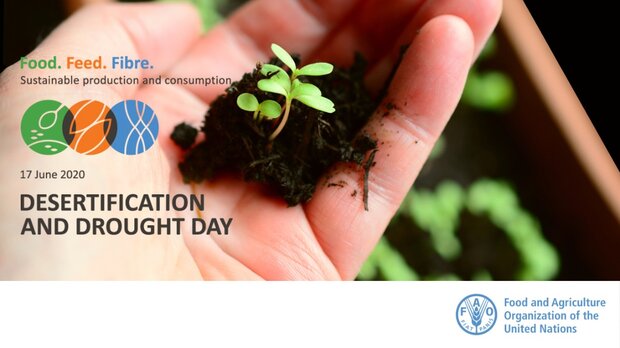During an event hosted today Tuesday 16 June 2020 by the Forests, Rangelands, and Watershed Management Organization, Mr. Ali Shahnian, FAO-Iran Project Operation Officer delivered a statement on behalf of Mr. Gerold Bödeker, FAO Representative to the Islamic Republic of Iran.
In his statement, Mr. Bödeker emphasized that preventing land degradation in arid, semi-arid, and dry sub-humid areas is an achievable target that can be realized through collective problem-solving, strong community involvement, and cooperation at all levels.
He underscored that changing consumer and corporate behavior, and adopting more efficient land use planning and more sustainable land management practices, will provide us with enough land to meet the demand for essentials and for a wider array of goods and services.
“We have no choice but to manage and utilize our resources much better. We need to enhance productivity and efficiency along the entire value chain,” highlighted Mr. Bödeker.
“FAO is fully committed to supporting the implementation of the United Nations Convention to Combat Desertification in order to increase resilience to climate change and drought through the promotion of sustainable land management practices as a means to improve people’s livelihoods,” noted FAO Representative in his concluding remarks.
The full text of the statement of Mr. Gerold Bödeker, the FAO Representative to the Islamic Republic of Iran on the occasion of World Day to Combat Desertification and Drought 2020 reads:
Your Excellency, the Minister of Agriculture Jahad, Mr. Khavazi,
Excellences,
Dear colleagues,
Ladies and Gentlemen,
Every year, on 17 June, the global community celebrates the World Day to Combat Desertification and Drought to promote public awareness on international efforts dedicated to this cause.
This day is a unique moment to remind everyone that preventing land degradation in arid, semi-arid, and dry sub-humid areas – which is a well-recognized definition of desertification – is an achievable target that can be realized through collective problem-solving, strong community involvement and cooperation at all levels.
Desertification should be viewed as a breakdown of the fragile balance that allowed plant, human, and animal life to develop harmoniously on the lands. This breakdown of the equilibrium represents the beginning of a self-destruction process for all elements of the life system on the planet.
Soil vulnerability to wind and water erosion, the lowering of the water table, the impairment of the natural regeneration of vegetation, and the chemical degeneration of soils are among the most immediate results of desertification.
Evidence also shows that desertification has a serious effect on the vulnerable populations in developing countries. By limiting the potential of natural resources, desertification reduces agricultural production and makes it increasingly precarious.
Overexploitation of the most readily available natural resources, selling off the agricultural production equipment, and increasing rural migration to urban areas in search of better living conditions are among the most common strategies taken by affected populations for survival in the face of desertification.
Besides, as the number of human population growths across the globe, more people settle in urban areas and the average amount of human consumption escalates, the demand for arable lands to provide human food, animal feed, and clothing fiber increases, while at the same time the health and productivity of existing lands not only declines due to the immediate human-induced practices but also deteriorates by the long-term effects of climate change.
UN predicts that by 2050, the world will have over 9.8 billion inhabitants which implies significantly more food, water, and other resources will be required to supply the world population with enough food, feed, and fiber.
All these predictions mean that in just 30 years, we will need an extra 593 million hectares of agricultural land to produce an additional 74,000 trillion calories required to supply the world population’s energy intake, an increase equivalent to a 56% rise in crop calories.
Considering these projected demands, we should also pay attention to an unfortunate fact that currently, around one-third of all food produced each year across the world is lost or wasted. This is equivalent to 1.3 billion tonnes of food with a footprint of 1.4 billion hectares, close to 30% of the world’s agricultural land areas.
The land surfaces presently used for grazing and grain production to feed animals account for 80% of agricultural land globally [7]. Moreover, recent estimations also reveal that by 2030, the fashion industry will use 35% more land – meaning over 115 million hectares.
Food, feed, and fiber must also compete with expanding cities and the fuel industry, which are also gobbling up land at rapid rates. The end result is that land is being converted and degraded at unsustainable rates.
All of these highlights that we have no choice but to manage and utilize our resources much better. We need to enhance productivity and efficiency along the entire value chain.
With changes in consumer and corporate behavior, and the adoption of more efficient land use planning and more sustainable land management practices, we will have enough land to meet the demand for essentials and for a wider array of goods and services.
FAO, as the lead UN agency in promoting resilient agricultural development, concentrates on solutions that we can find in nature to tackle complex challenges and supply our needs in a sustainable way. This is especially important in a moment where the COVID-19 pandemic and the economic disruption threaten food security, nutrition, health, and the livelihoods of millions of people, exposing the fragilities of our ecosystems and food systems.
FAO along with other UN entities engaged in advocating “United Nations Convention to Combat Desertification (UNCCD)” are fully committed to supporting the implementation of the UNCCD in order to increase resilience to climate change and drought through the promotion of sustainable land management practices as a means to improve people’s livelihoods.
Thank you
MNA/

























Your Comment